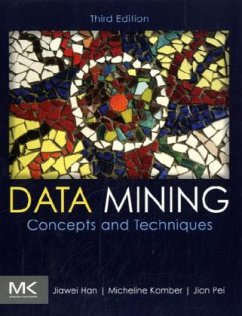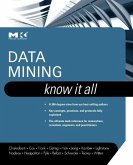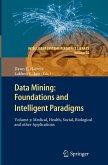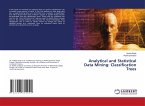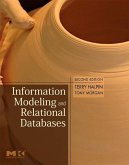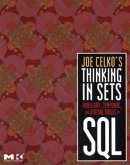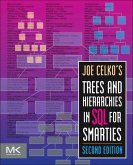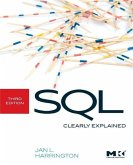Data Mining: Concepts and Techniques provides the concepts and techniques in processing gathered data or information, which will be used in various applications. Specifically, it explains data mining and the tools used in discovering knowledge from the collected data. This book is referred as the knowledge discovery from data (KDD). It focuses on the feasibility, usefulness, effectiveness, and scalability of techniques of large data sets. After describing data mining, this edition explains the methods of knowing, preprocessing, processing, and warehousing data. It then presents information about data warehouses, online analytical processing (OLAP), and data cube technology. Then, the methods involved in mining frequent patterns, associations, and correlations for large data sets are described. The book details the methods for data classification and introduces the concepts and methods for data clustering. The remaining chapters discuss the outlier detection and the trends, applications, and research frontiers in data mining.
This book is intended for Computer Science students, application developers, business professionals, and researchers who seek information on data mining.
This book is intended for Computer Science students, application developers, business professionals, and researchers who seek information on data mining.
"A well-written textbook (2nd ed., 2006; 1st ed., 2001) on data mining or knowledge discovery. The text is supported by a strong outline. The authors preserve much of the introductory material, but add the latest techniques and developments in data mining, thus making this a comprehensive resource for both beginners and practitioners. The focus is data-all aspects. The presentation is broad, encyclopedic, and comprehensive, with ample references for interested readers to pursue in-depth research on any technique. Summing Up: Highly recommended. Upper-division undergraduates through professionals/practitioners." --CHOICE
"This interesting and comprehensive introduction to data mining emphasizes the interest in multidimensional data mining--the integration of online analytical processing (OLAP) and data mining. Some chapters cover basic methods, and others focus on advanced techniques. The structure, along with the didactic presentation, makes the book suitable for both beginners and specialized readers." --ACM s Computing Reviews.com
"We are living in the data deluge age. The Data Mining: Concepts and Techniques shows us how to find useful knowledge in all that data. Thise 3rd editionThird Edition significantly expands the core chapters on data preprocessing, frequent pattern mining, classification, and clustering. The bookIt also comprehensively covers OLAP and outlier detection, and examines mining networks, complex data types, and important application areas. The book, with its companion website, would make a great textbook for analytics, data mining, and knowledge discovery courses." --Gregory Piatetsky, President, KDnuggets
"Jiawei, Micheline, and Jian give an encyclopaedic coverage of all the related methods, from the classic topics of clustering and classification, to database methods (association rules, data cubes) to more recent and advanced topics (SVD/PCA , wavelets, support vector machines) . Overall, it is an excellent book on classic and modern data mining methods alike, and it is ideal not only for teaching, but as a reference book." --From the foreword by Christos Faloutsos, Carnegie Mellon University
"A very good textbook on data mining, this third edition reflects the changes that are occurring in the data mining field. It adds cited material from about 2006, a new section on visualization, and pattern mining with the more recent cluster methods. It s a well-written text, with all of the supporting materials an instructor is likely to want, including Web material support, extensive problem sets, and solution manuals. Though it serves as a data mining text, readers with little experience in the area will find it readable and enlightening. That being said, readers are expected to have some coding experience, as well as database design and statistics analysis knowledge Two additional items are worthy of note: the text s bibliography is an excellent reference list for mining research; and the index is very complete, which makes it easy to locate information. Also, researchers and analysts from other disciplines--for example, epidemiologists, financial analysts, and psychometric researchers--may find the material very useful." --Computing Reviews
"Han (engineering, U. of Illinois-Urbana-Champaign), Micheline Kamber, and Jian Pei (both computer science, Simon Fraser U., British Columbia) present a textbook for an advanced undergraduate or beginning graduate course introducing data mining. Students should have some background in statistics, database systems, and machine learning and some experience programming. Among the topics are getting to know the data, data warehousing and online analytical processing, data cube technology, cluster analysis, detecting outliers, and trends and research frontiers. Chapter-end exercises are included." --SciTech Book News
"This interesting and comprehensive introduction to data mining emphasizes the interest in multidimensional data mining--the integration of online analytical processing (OLAP) and data mining. Some chapters cover basic methods, and others focus on advanced techniques. The structure, along with the didactic presentation, makes the book suitable for both beginners and specialized readers." --ACM s Computing Reviews.com
"We are living in the data deluge age. The Data Mining: Concepts and Techniques shows us how to find useful knowledge in all that data. Thise 3rd editionThird Edition significantly expands the core chapters on data preprocessing, frequent pattern mining, classification, and clustering. The bookIt also comprehensively covers OLAP and outlier detection, and examines mining networks, complex data types, and important application areas. The book, with its companion website, would make a great textbook for analytics, data mining, and knowledge discovery courses." --Gregory Piatetsky, President, KDnuggets
"Jiawei, Micheline, and Jian give an encyclopaedic coverage of all the related methods, from the classic topics of clustering and classification, to database methods (association rules, data cubes) to more recent and advanced topics (SVD/PCA , wavelets, support vector machines) . Overall, it is an excellent book on classic and modern data mining methods alike, and it is ideal not only for teaching, but as a reference book." --From the foreword by Christos Faloutsos, Carnegie Mellon University
"A very good textbook on data mining, this third edition reflects the changes that are occurring in the data mining field. It adds cited material from about 2006, a new section on visualization, and pattern mining with the more recent cluster methods. It s a well-written text, with all of the supporting materials an instructor is likely to want, including Web material support, extensive problem sets, and solution manuals. Though it serves as a data mining text, readers with little experience in the area will find it readable and enlightening. That being said, readers are expected to have some coding experience, as well as database design and statistics analysis knowledge Two additional items are worthy of note: the text s bibliography is an excellent reference list for mining research; and the index is very complete, which makes it easy to locate information. Also, researchers and analysts from other disciplines--for example, epidemiologists, financial analysts, and psychometric researchers--may find the material very useful." --Computing Reviews
"Han (engineering, U. of Illinois-Urbana-Champaign), Micheline Kamber, and Jian Pei (both computer science, Simon Fraser U., British Columbia) present a textbook for an advanced undergraduate or beginning graduate course introducing data mining. Students should have some background in statistics, database systems, and machine learning and some experience programming. Among the topics are getting to know the data, data warehousing and online analytical processing, data cube technology, cluster analysis, detecting outliers, and trends and research frontiers. Chapter-end exercises are included." --SciTech Book News

